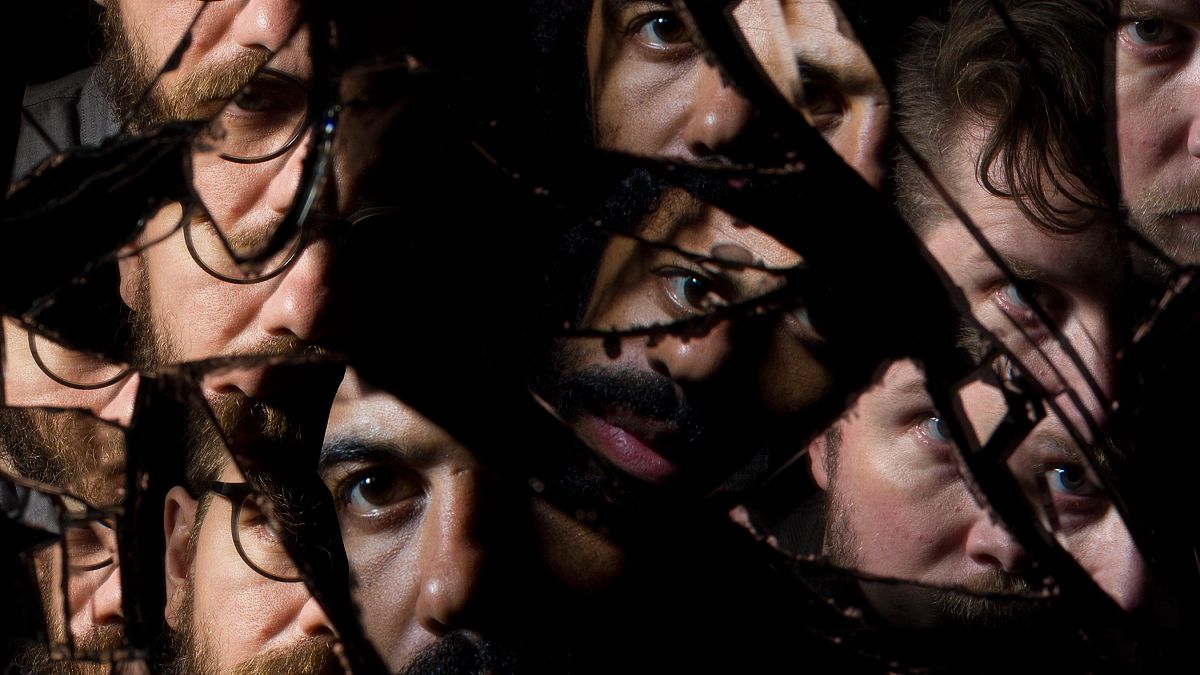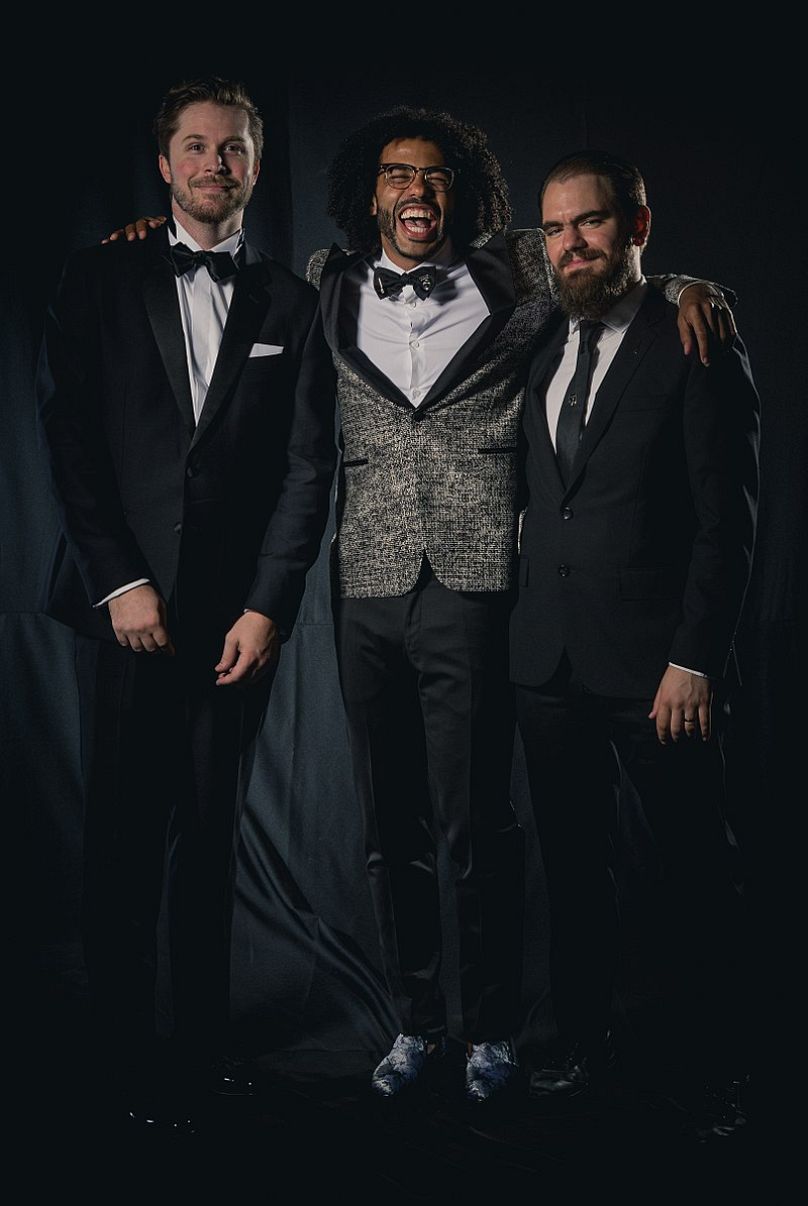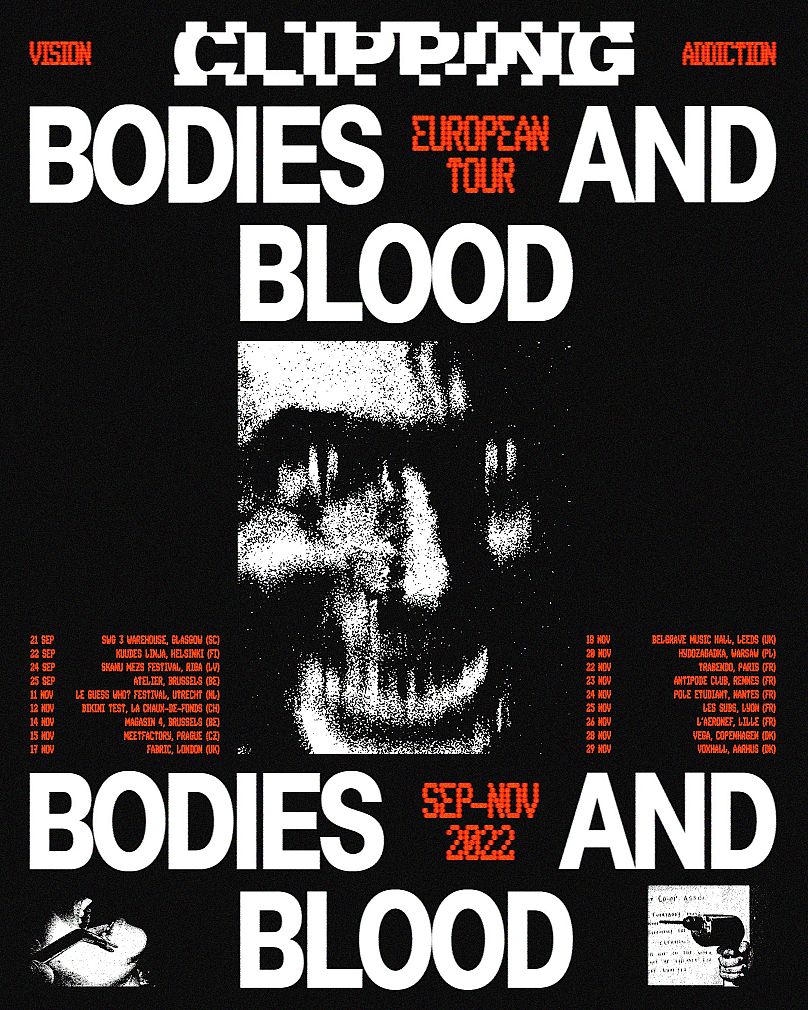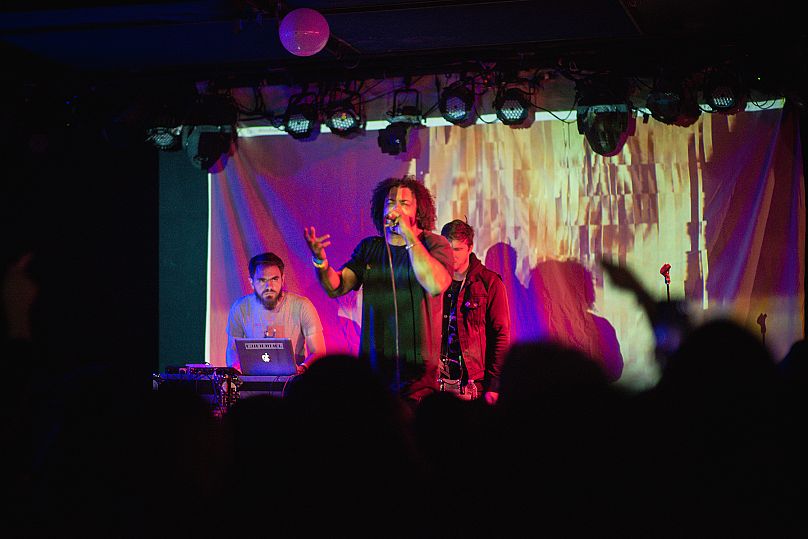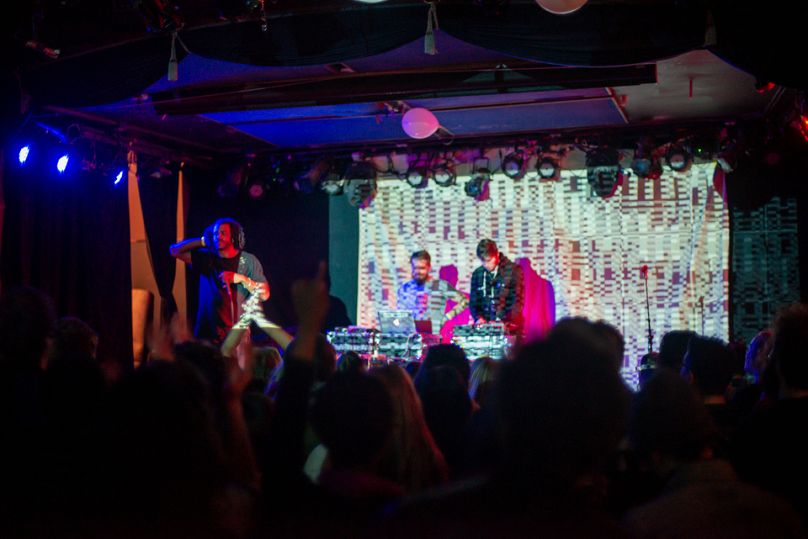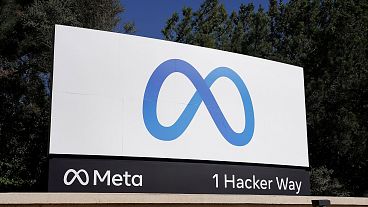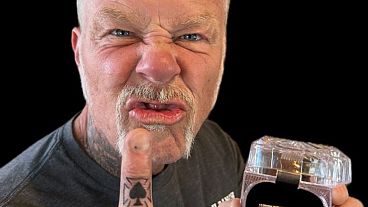Euronews Culture caught up with experimental hip-hop trio Clipping as they embark on the European leg of their Bodies and Blood tour, to talk about cinema influences, post-pandemic touring and the real-life horrors looming over us.
Meet LA-based experimental hip-hop trio Clipping – often stylized as clipping..
The band is composed of rapper (and former star of Broadway’s Hamilton and actor in Black-ish) Daveed Diggs and producers William Hutson and Jonathan Snipes, and it’s no hyperbole to state that they are one of the most exciting and creative bands around today.
Their music defies labels, but if one were to say they exist in the intersection where convention-breaking hip-hop, verbose rapping, narrative cinema, and creepy industrial soundscapes meet, you have some idea of what sonic experience you’re letting yourself in for.
It doesn’t sound like it should work on paper, but it does. Moreover, no one else is doing anything that sounds quite like them. Their music is transportive and at times abrasive, a moody soundtrack to a conceptual fever dream you didn’t know you needed in your ears.
They started in 2009 and released several mixtapes, which were constructed with certain sets of self-imposed guidelines: no drum sounds and no harmony were among the original “rules”.
Since signing to Sub Pop Records in 2013, they’ve branched out and reached a bigger audience.
Their 2016 album 'Splendor & Misery' saw the band embrace sci-fi cinematic tropes to create a grandiose afrofuturist concept album. The band then released 'There Existed An Addiction To Blood' (2019) and 'Visions of Bodies Being Burned' (2020), a masterful horrorcore diptych / ode to the horror genre that sees them at their most melodic but also their most frenetically inventive.
Whether its sending love letters to John Carpenter ('Nothing Is Safe'), tipping their hat to the treasured Final Girl trope ('Neve Campbell 96') or burning a piano for 18 minutes in their take on Neil Lockwood’s performance art ('Piano Burning'), their appreciation of horror as an artform and as medium for thrilling, world-reflecting allegory is clear and very, very exciting.
Euronews Culture caught up with Clipping as they embark on the European leg of their Bodies and Blood tour to talk about cinema influences, post-pandemic touring and the real-life horrors looming over us.
Euronews Culture: First things first, and without wanting to go all Ghostface on you – what are your favourite scary movies?
Jonathan Snipes:Candyman, the 1992 version, for sure.
Daveed Diggs: That’s probably mine too.
Will Huston:The Innocents, the 1960s film with Deborah Kerr for me. It’s impossible to just pick one – maybe Jacques Tourneur’s I Walked With A Zombie.
DD:Leprechaun 4 maybe? (Laughs)
What is it about the horror genre that resonates with you and that led to this diptych of albums centered around horror?
DD: It was a project for these last two albums. We all watch a lot of horror films and as a genre, it’s generally a good way to talk about the things that culturally we are scared of at any given moment. And given that that’s a thing we do with our music as well, it seemed like a natural fit.
JS: There’s also a tradition of horror in rap music, so it felt like a thing we could participate in, whilst referencing our tastes.
WH: Another element is that some of our influences are also very connected to horror, in terms of experimental music. And even when experimental music isn’t explicitly about horror, any time you play a piece of experimental music for students – and Jonathan can attest to this, as he teaches theatre sound design at UCLA and I used to as well – without question their response to it is “That sounds so scary!” Even if it’s not at all scary.
JS: Aperiodicity is scary – the further we drift from the octave, the scarier it gets as it becomes less predictable.
Are you happy with the term ‘concept album’ for your releases, knowing that it can have a certain pretension attached to it?
DD: It’s fine with me. We’re relatively pretentious sometimes, but also I think that none of these things matter to the artist. Labels don’t come into play when you’re talking to other artists.
WH: We also like concept albums! I know that concept albums culturally have this bloated 70s prog epic reputation, but at the same time we like the format of an album, as opposed to individual songs.
DD: I wish we were better at making singles, but we’re not! (Laughs)
WH: I almost think that any good album could be considered a concept album. Even if the concept is ‘This is the context in which we made these songs and they sound similar because of it.’ A good album should feel like a single statement.
JS: The concept for this album is three-minute songs with guitars, drums and base! (Laughs)
WH: From us, that would be a concept album! (Laughs)
Talking of labels, whenever I’m introducing your music to people who haven’t heard of you, the first thing I do is play them ‘Nothing is Safe’ and tell them about you recording a piano burning for 18 minutes. But I never know how to aptly describe you – noise rap, horrorcore, experimental hip-hop…
JS: (Laughs) Well, you have to label something in order to sell it, so that’s fine.
DD: It was a bigger issue for our record label than for us, especially when we didn’t have a fanbase and when we were trying to figure out how to talk about it. But then again, how do you describe any band you actually like? You rarely talk about their genre – you talk about what it makes you feel, you share, and then people form their own opinions about it. And all of a sudden, that label doesn’t mean anything anymore.
WH: The one thing we always say is that it’s rap. Rapping is an activity, a very specific skill and almost all of our songs have that. We can always say that there’s rapping on these songs. That’s as much as we need to worry about.
How do you bring the theatricality and the cinematic quality of your albums to your live performances, or do you view those two things as completely separate? After all, you can’t very well burn a piano every night… Which is a shame, really…
DD: (Laughs) Yeah, they’re rap shows and they function as such. At least the way people generally behave at our shows, it would feel really dumb to do a bunch of crazy cinematic things and add some set pieces. People come out to listen to the music and to get wild. When we first started, we would try to do a bunch of weird, austere things that separated us from the audience, and that made it more of a performance art piece. And that felt pretty dishonest pretty quickly. And the more that we started leaning into the fact that this is a rap show, the better things got.
WH: There was a review of our show from two nights ago that I read, that was an incredibly positive review. I don’t want to talk shit. But the framing of the whole piece was: ‘Can Clipping create the same experience of listening to their albums live or will it disappoint?’ Because the albums are intricate and there are characters who repeat… And of course we can’t do that live. We’re not going to do a storytelling rap show. We’re just going to blast the songs and have a good time. Yes, the words are the same but no one expects anyone coming to a live show to follow all the narrative threads. I expect them to respond to what the songs sound like sonically and emotionally in that moment. And if they liked it, maybe they can go home afterwards and figure out what they’re about. But live, I’m not worried if anyone understood what they were about! (Laughs)
JS: And why would we try to recreate the experience of listening to the albums? We’ve already made the experience – this is a different medium. The live thing is a different thing. And considering the size of the venues we’re playing in, this makes sense. If we were playing stadiums, maybe we’d have to figure something else out.
DD: Giant puppets our ourselves, maybe… (Laughs) Playing shows is like a game of energy management as well. It’s all about how we create the energetic ups and downs that you want in a show. At the end of the day, we’re here to have a good time and hopefully everybody else is there to have a good time too. So far, that’s proven to be true. The audience have been more ready for a good time than I was! (Laughs)
JS: Turns out we got old over the pandemic! (Laughs)
The Bodies and Blood tour is under way and you’re heading to mainland Europe. How do you find the European audiences compared to the US audiences?
DD: I remember when we first started touring, each country had its own audience vibe. But now the differences seem to get less and less. But maybe that’s because we haven’t played in a long time and we’ve gained a bunch of fans that we didn’t have before the pandemic. I don’t know. We’re learning right now!
WH: I think we’re appealing to a similar crowd in each country and there’s enough video out there to show people what to expect in a show. We’ve not had a show be super calm! We haven’t had any silent chin-scratching attentive audiences! We’ve had dance, scream the words along…
JS: When we started touring this band, we were presenting music to an audience to had never heard it before, and there would be one or two people at each show who really got it. Now, it’s more about curating the order in which people get to hear the songs they may already know. I think we had more of a sense of audience differences back in the earlier days.
DD: Plus we haven’t played in the US for a while now – I couldn’t tell you what a US audience feels like now!
Is touring still as fun for you guys, or do the realties of touring mean that it’s more exhausting then anything else?
DD: Can it be both? (Laughs)
WH: The shows are so much fun. Hanging out is really fun, and I love touring because it’s a weird anxiety management tactic to have one thing that matters today: getting to the venue and doing the show. It obliterates all the other things you could be worried or thinking about. We also love looking for weird food we’ve never seen in other places, you know? It’s like travelling. But also some nights, it’s two hours of sleep.
JS: It’s exhausting and frustrating and wreaks havoc on your health and the body, but it’s also the most fun and the best job in the world. We’re incredibly lucky. People sometimes say ‘Oh, it must be so hard and tiring.’ Yes, but we’re playing music we made for people who enjoy it every night.
A lot of artists have been outspoken about the realities of gigging. Animal Collective recently announced that they had to cancel their tour; Lorde addressed the financial realities of touring and how difficult it is; Santigold even cancelled her tour in September. I’m not asking for a breakdown of your numbers, but there does seem to be a general feeling that it’s increasingly harder for artists to go on tour at the moment. Is this a consideration for you and have you faced that in any way?
JS: Sure, but I would say that our overhead is a lot lower than any of these artists. There are six of us on this tour in total, we have no props or stage setup, and we can all fit in one band. It’s intentional, to reduce overhead and make it financially viable.
WH: Another aspect of it is that we love this band and it is a job, but we also have other jobs…
DD: Yeah, this has never been a huge cash cow for us! (Laughs)
WH: And I guess we’ll see how financially viable this tour was when we get home!
DD: We’ve definitely toured and lost money before…
JS: No, I don’t think we’ve lost money. We’ve broken even a couple of times, but we’ve never lost money. And we’ve never asked for tour support from our record label.
DD: That’s true!
JS: We’ve never had to pay anything back to the label. We all come from really DIY touring – doing the bookings ourselves, doing merch, being our own tour managers…
WH: Sleeping on the floor of punk houses where you played the show…
JS: Sometimes booking a hotel room which you share and you negotiate who gets the bed that night… So yeah, small group, small overhead.
Coming back to horror, this time more real-life horror… Trump has announced that he’s seeking re-election and you’ve been outspoken in your songs. Your track ‘Chapter 319’ was written explicitly in support of Black Lives Matter and even became a TikTok meme, with people miming the lyrics “Donald Trump is a white supremacist / If you vote for him you’re a white supremacist”…
DD: It was important for us in that moment, and it still is. One of the interesting things about this band is that we removed the rule of having any first-person narrative in it. Because of that you can remove yourself from it, so it became an exercise in how we put our politics back into it. Because that is still important. And it turns out that the music feels even more personal than some of the other stuff I make. I think we did a good job with that song, and it was important for us to contribute to the spirit of the marches. It was cool that it then got used and that this song was for this purpose.
JS: That song, or 'Knees on the Ground', or 'Fat Fingers' are not part of the Clipping canon of albums. They don’t fit into that world, even if they’re songs by us. They’re like momentary reactions to a thing that’s happening right now, that is relevant right now. And hopefully won’t be in the future. But unfortunately those songs continue to be relevant.
You mention removing rules and Clipping is a band that adheres to certain stylistic limitations, like real-world sampling and not rapping in the first-person. Are these limitations freeing for you?
JS: We’re less explicit about them than when we started…
WH: That’s sort of what having a concept is. You constrain the field of possibility and a lot of generative and productive ideas come out of not necessarily rules, but constraints. We do have a list of things that every album is and what we can do within that. That’s the process of making an album for us. We don’t necessarily start with a list of rules, but as you start to make it, you figure out what the world is and you build the world of the album and define the constraints as you go.
JS: And then there’s a point when those constraints dissolve and become intuitive. And rather than it being ‘We can only use these kinds of sounds’, you have enough material to know what the feeling is and intuit where to go next. And that’s a fun place to be.
And what is next for you? There was a sci-fi arc to 'Splendor & Misery' (2016) and a horror one for both 'There Existed an Addiction to Blood' and 'Visions of Bodies Being Burned' – will you be exploring different cinematic genres? Can I pitch Clipping-does-Romantic Comedy?
WH: (Laughs) Historical romance!
JS: (Laughs) I don’t think we should say – probably best not talk about work in progress, but I will say that usually what happens is that we’re working on an album and we make one song that doesn’t fit and feels like it’s in a new genre, and we hang onto that and make an album around it. And that’s what’s happened this time as well.
I heard somewhere that you’re toying with the idea of releasing a Christmas album. Is there any truth to that?
WH: (Laughs) It doesn’t exist and people talk about it as though it exists and we’re not releasing it. Like I’m keeping us from releasing it! No, I’m keeping us from making it! (Laughs)
JS: The band is a unit and it has to be a common decision. But we’ll keep working on it!
DD: We’ll keep pushing! We’ve got a really good Christmas album inside us! (Laughs)
WH: I will say that I do love Christmas songs. I have a whole playlist!
We started this interview by talking about films, so I’ll make the most of chatting with three cinephiles to ask what are the films you’ve seen recently that have had an impact on you… Or could potentially influence your music?
DD:Everything Everywhere All At Once was a great movie.
WH: I liked Prey a lot, that Predator movie.
DD: What was the one with Idris Elba fighting a lion?
WH:Beast!
DD:Beast!
WH: I have a lot of affection for giant monster attack movies – they’re all just Jaws again, but they’re so deeply silly! Daveed and I were in a completely empty theatre together, a massive stadium screen.
DD: I had a great time at that movie. I also loved Wakanda Forever. It’s like (director Ryan) Coogler’s love letter to his dead friend. It’s incredibly sad for a superhero movie and I thought it was beautiful. I didn’t know you could do that in that genre and it was a revelation to watch.
JS: There’s this film that’s not entirely new but recent, a Georgian documentary called Taming the Garden (2021). I can’t get it out of my head. It’s about the billionaire who collects all of the oldest trees in Georgia and who has the uprooted and moved to his private garden. It’s told entirely from the boots on the ground perspective of the people who have to move the trees and you never meet eccentric rich person. It’s one of the most beautiful looking and sounding movies I’ve seen ever. I’m really obsessed with it.
Thank you for those recommendations and see you on tour next week in France!
DD: See you there. Come say hi!
Clipping’s Bodies And Blood tour is currently on the go. Catch them in France (22-26 November), Denmark (28-29 November), Ireland (30 November & 3 December), the UK (1-5 December) and Finland (7 December).
